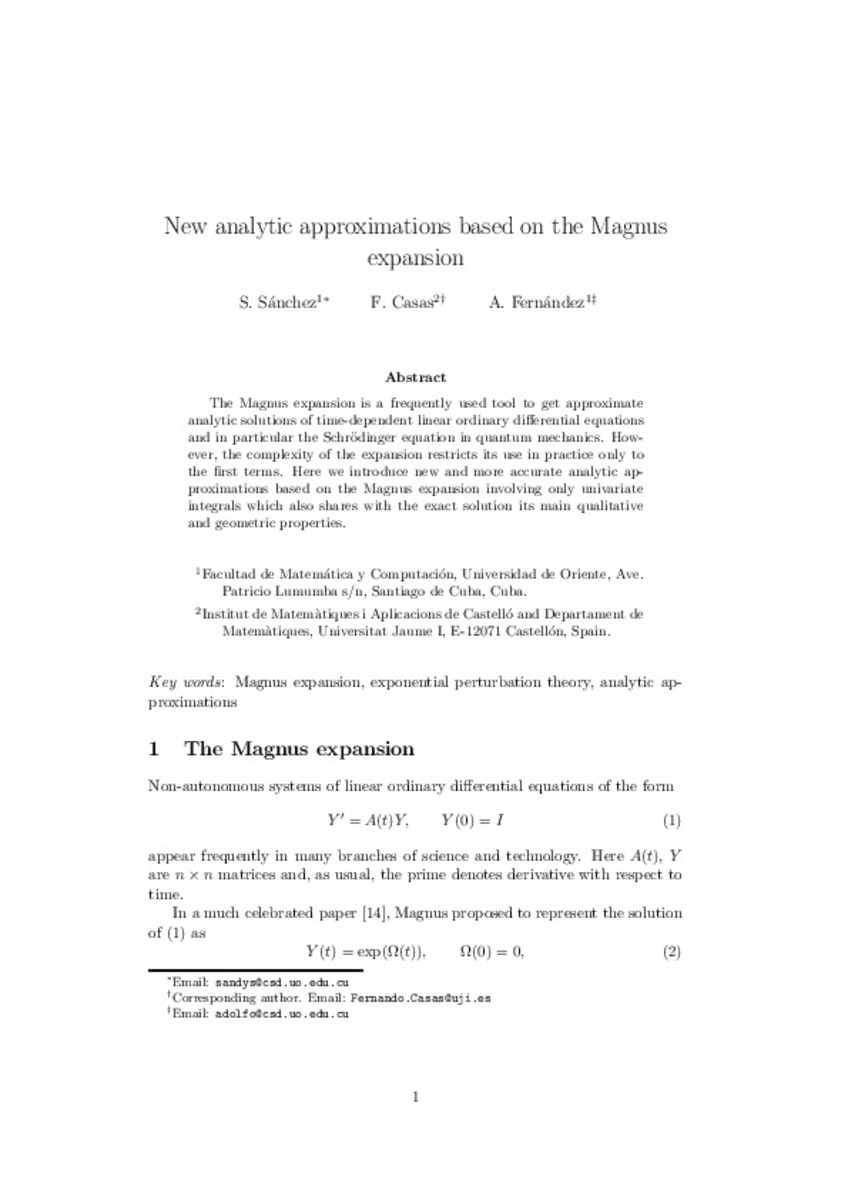Mostrar el registro sencillo del ítem
New anallytic approximations based on the Magnus expansion
| dc.contributor.author | Sánchez, S. | |
| dc.contributor.author | Casas, Fernando | |
| dc.contributor.author | Fernández, A. | |
| dc.date.accessioned | 2012-05-30T11:48:54Z | |
| dc.date.available | 2012-05-30T11:48:54Z | |
| dc.date.issued | 2011-09 | |
| dc.identifier.citation | Journal of mathematical chemistry (Sep. 2011), vol. 49, no. 8, 1741-1758 | ca_CA |
| dc.identifier.issn | 0259-9791 | |
| dc.identifier.issn | 1572-8897 | |
| dc.identifier.uri | http://hdl.handle.net/10234/39340 | |
| dc.description.abstract | The Magnus expansion is a frequently used tool to get approximate analytic solutions of time-dependent linear ordinary differential equations and in particular the Schrödinger equation in quantum mechanics. However, the complexity of the expansion restricts its use in practice only to the first terms. Here we introduce new and more accurate analytic approximations based on the Magnus expansion involving only univariate integrals which also shares with the exact solution its main qualitative and geometric properties | ca_CA |
| dc.format.extent | 18 p. | ca_CA |
| dc.format.mimetype | application/pdf | ca_CA |
| dc.language.iso | eng | ca_CA |
| dc.publisher | Springer Science+Business Media, LLC | ca_CA |
| dc.relation.isFormatOf | Pre-print del document publicat a: http://rd.springer.com/article/10.1007/s10910-011-9855-y | ca_CA |
| dc.rights | © Springer Science+Business Media, LLC 2011 | ca_CA |
| dc.rights.uri | http://rightsstatements.org/vocab/InC/1.0/ | * |
| dc.subject | Magnus expansion | ca_CA |
| dc.subject | Exponential perturbation theory | ca_CA |
| dc.subject | Analytic approximations | ca_CA |
| dc.subject.lcsh | Approximation theory | ca_CA |
| dc.subject.lcsh | Perturbation (Mathematics) | ca_CA |
| dc.subject.other | Aproximació, Teoria de l' | ca_CA |
| dc.subject.other | Pertorbació (Matemàtica) | ca_CA |
| dc.title | New anallytic approximations based on the Magnus expansion | ca_CA |
| dc.type | info:eu-repo/semantics/article | ca_CA |
| dc.identifier.doi | http://dx.doi.org/10.1007/s10910-011-9855-y | |
| dc.rights.accessRights | info:eu-repo/semantics/openAccess | ca_CA |
| dc.type.version | info:eu-repo/semantics/sumittedVersion |
Ficheros en el ítem
Este ítem aparece en la(s) siguiente(s) colección(ones)
-
MAT_Articles [756]
Articles de publicacions periòdiques







